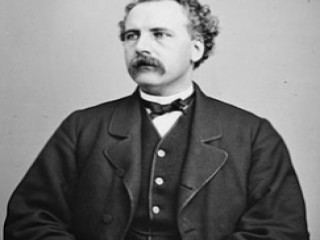
George Henry Boker biography
Date of birth : 1823-10-06
Date of death : 1890-01-02
Birthplace : Philadelphia, Pennsylvania
Nationality : American
Category : Famous Figures
Last modified : 2011-06-08
Credited as : Playwright, Francesca da Rimini,
0 votes so far
In 1848 his first volume of verse, "The Lessons of Life, and other Poems," was published.
Also, he met Bayard Taylor and Richard Henry Stoddard, who would be long-lasting friends. This group of young men supported and encouraged each other in the face of official journalistic criticism.
Launched in the literary life, Boker began to write assiduously. His first play, Calaynos, went into two editions during 1848, and the following year was played by Samuel Phelps at Sadler's Wells Theatre, London, May 10. This tragedy is notable for its depiction of the racial issues between the Spanish and the Moors.
This was soon followed by other plays. The next to be staged was a comedy, The Betrothal (1850). Two other tragedies from this time are Anne Boleyn (1850) and Leonor de Guzman (1853).
During this time, in correspondence with his friends, Boker was determining to himself the distinction between poetic and dramatic style. But Boker was not wholly wed to theatrical demands; he still approached the stage in the spirit of the poet who was torn between loyalty to poetic indirectness, and necessity for direct dialogue.
Francesca da Rimini, (1853) is the play he is most well-remembered for. It is a verse tragedy based on the story of Paolo and Francesca from the fifth canto of Dante's Inferno. Boker published the original version, called the reading version, but used an acting version for the stage which had more directness and dramatic flow. This allowed for a compromise between the poet of the reading version and the demands of the theatre.
The American Civil War not only turned Boker's pen to the Union Cause, but changed him politically from a Democrat to a staunch Republican. In fact, his name is closely interwoven with the rehabilitation of the Republican party in Philadelphia. His volume "Poems of the War," was issued in 1864.
In the 1860s, the Union League Club was founded, with Boker as the leading spirit; through his efforts the war earnestness of the city was concentrated here; from 1863-71 he served as its secretary; from 1879-84 as its President. But Boker's thoughts were also concerned with poetry. In 1869, Boker issued Königsmark, The Legend of the Hounds and other Poems, and this ended his dramatic career until his return from abroad.
In 1882 Lawrence Barrett mounted a revival of Francesca da Rimini. This brought more public interest in Boker and his other work, which necessitated the reprinting of several of his books.
His home in Philadelphia—one of the literary centres of the time,--bore traces of his Turkish stay—carpets brought from Constantinople, Arabic designs on the draperies, and rich Eastern colours in the tapestried chairs.
Boker was also a director of the Mechanics National Bank of Philadelphia for several years later in his life.
Boker died in Philadelphia, January 2, 1890.
In addition to the works already mentioned, Boker also wrote hundreds of sonnets. A collection of these, Sequence on Profane Love, was discovered in manuscript after his death, and published in 1927. He has been compared to Henry Wadsworth Longfellow as one of the premier American sonnet writers.
Author of books:
The Lesson of Life, and Other Poems (1848, poetry)
Poems of the War (1864, poetry)
Konigsmark (1869, poetry)
The Book of the Dead (1882, poetry)
Wrote plays:
Calaynos (1848)
Anne Boleyn (1850)
Leonor de Guzman (1853)
Francesca da Rimini (1855)
















